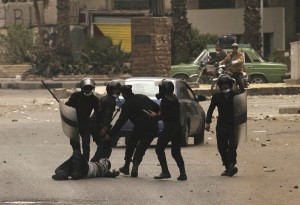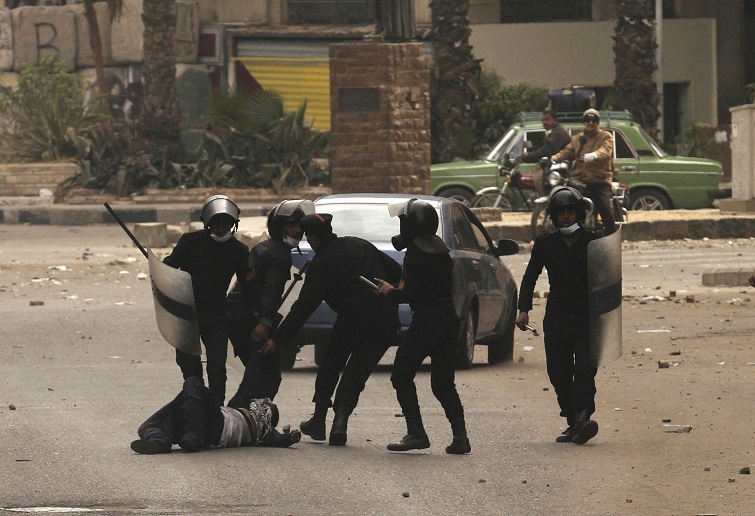
(AFP File Photo)
Moustafa Ibrahim was found dead inside Matariya police station’s detention room, with fellow inmates asserting he was tied by a police officer for eight hours until his death, prosecution findings reported.
Ibrahim was detained on charges of possessing narcotics, state-owned newspaper Al-Ahram reported, with the newspaper also publishing a graphic picture of the deceased in the morgue. It was not clear from the picture whether he retained any signs of torture.
A legal source who is following the case, and who requested anonymity, said that Ibrahim died on 22 February. His death occured after “being tortured by electric shocks and being tied from the ceiling for eight hours, which caused an internal hemorrhage”.
Ibrahim is the third prisoner to die inside the controversial Matariya police station. Two men died last week in the same police station, with the families of the deceased accusing the police of torture. The two were named as Emad Ahmed El-Attar and a lawyer named Kareem Hamdy.
The Ministry of Interior told Daily News Egypt that one of the deaths occurred due to “a circulatory collapse”.
Ministry spokesperson Hany Abdel Latiff said that security forces are cooperating with the prosecution regarding the investigations into the death of Hamdy in the police station. However, Abdel Latiff added that Hamdy belonged to a “terrorist cell in Matariya”, asserting that the police will respect the decision of the prosecution.
“We are in a war against terrorism, which includes the death of many martyrs, and mistakes committed,” Abdel Latiff told state owned MENA.
Hamdy’s death sparked outrage on social media, as well as among activists and lawyers.
On 26 February, the Prosecutor General ordered a media gag on further investigations into the case.
However, prior to the media gag, state media reported that two police officers from the National Security apparatus were detained, having been charged of beating Hamdy to death during his interrogation.
Hamdy was imprisoned pending investigations. His family told Daily News Egypt that during the first session of investigations in New Cairo, he reported violations against him, such as torture and beatings. “When he returned to Matariya Police Station, the officers retaliated and beat him to death,” his family said.
Preliminary investigations showed that after he was interrogated by officers in the police station he collapsed and died, Al-Ahram reported. The initial forensic report said that Hamdy “suffered broken ribs and a severe internal bleeding in the brain, which confirms he was beaten”.
The newspaper added that the two officers denied the charges and said they only investigated him.
The Legal Office of the Salafi Front published graphic photos of Hamdy following the autopsy. The pictures clearly show signs of beatings on the chest and the back, as well as injuries to the left eye.
This is the second time this year that the prosecution orders a media gag on a case related to murder. The first was the murder of political activist Shaimaa El-Sabagh, after police forces dispersed a peaceful demonstration in which she participated to commemorate the 25 January Revolution.
Online activists and fellow lawyers of Hamdy asked social media users to “break the silence”, and to publish details of the investigations that the prosecution is currently engaging in.
The Freedom and Justice Party (FJP), the now banned Muslim Brotherhood’s political arm, said in a statement “the murder of Kareem Hamdy is another part of the series of violations in the reign of the bloody coup”.
“Police stations and prisons have become slaughterhouses for torture and systematic assassination for the free [revolutionaries]”, the party added. It also said that many human rights organisations have counted 212 detainees killed in custody, with reasons ranging from “torture… [to the] intentional denial of medical care”.
The other prisoner killed, Emad Ahmed El-Attar, was arrested on 26 January during protests in Matariya. His cousin, Ahmed, told Daily News Egypt that El-Attar was severely tortured by police agents inside the police station.
El-Attar’s family told Daily News Egypt that he was denied any medical care for a month, and in some cases the family had to bribe the guards to smuggle food or medication to him.
Several international and local human rights organisations condemned the death, warning against the rise of torture as a tool by the police.
London-based Human Rights Monitor said the “Egyptian authorities continue violate human rights, including arresting civilians without charges and torturing them inside police stations”.
The organisation added the Egyptian state is underestimating the lives of its citizens, and demanded international investigators and fact-finding committees to monitor Egyptian detention centres and police stations.
The Egyptian Coordination of Rights and Freedoms described the incident as a “brutal crime, which should be investigated as soon as possible”. The organisation also pointed out that the incident included not only a violation against a citizen in custody of the security forces, but also against a lawyer.
In a recent development, the killing of Hamdy sparked outrage inside the Lawyer’s Syndicate, as the head of the syndicate Sameh Ashour promised to prosecute those responsible for Hamdy’s death.
However, Ashour’s pro-army and police inclinations were met critically by young lawyers, who said: “What we are suffering from violations against lawyers are a result of years of having syndicate leader whose only goal is to be close to the state and to run for the parliamentary elections”.
Ashour is a vocal supporter of President Abdel Fattah Al-Sisi, and will run in the upcoming elections.
The lawyers vowed to protest the incident Sunday in front of the Syndicate.

